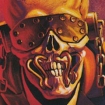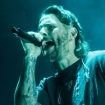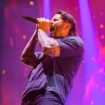Road-tested and hungry, Avenged Sevenfold hit the studio with Andrew Mudrock in 2005 to work on their major-label debut. The resulting record, that year's City of Evil, saw the band radically tinkering with their sound, most noticeably in M. Shadows' vocals, which shifted from a metalcore scream to a mix of power-metal wail and glam-inflected snarl. Not surprisingly, the album turned off many fans initially. But on the backs of unlikely rock-radio smash and TRL No. 1 video, "Bat Country," City of Evil ultimately broke A7X big. Here, the kids from Huntington Beach, California — vocalist M. Shadows and guitarists Zacky Vengeance and Synyster Gates — look back at the album that soared the group to stratospheric heights.
M. SHADOWS By City of Evil, we basically had done the whole metalcore thing. We thought we did it pretty cool, we did it different than everybody, but we just didn't want to scream anymore, you know? So we were just kind of like, "Let's make a full-on metal record." And at this time, we knew we could play up to that level. So we went in the studio and, just, Jimmy killed it, Brian and Zack killed it.
I remember the only thing that was weak on Jimmy's game was his kick-drum stuff. He just couldn't go long and hard for a long time. So I remember we'd play video games at his house, and he'd sit behind the couch with his drum stool and he'd have his kick drum set up, just his pedal, and we'd be sitting there playing with the sound off, and he'd just have the metronome going, like, kicking the thing, and he'd just do it for hours and then he'd do it faster and faster until it was, like, 210 beats per minute. So that's why he became like a machine at it.
With the guitars, our inspiration at that point was we wanna play better than Children of Bodom. That was, like, the band we were looking up to at that time. Like, we want to fucking play guitar like that but be an American-style band but have those Euro elements. And so we took everything from Dream Theater to Pantera and Metallica to Children of Bodom to Blind Guardian to Queen to everything, and that's what's mixed into that record, just it's insanity, everything's too fast but it's awesome, you know? I listen to it now and I just think, What the fuck! How do you even play that fast? Like, it's just silly.
ZACKY VENGEANCE Recording City of Evil, we were literally in the middle of the fucking worst ghetto in Los Angeles. We couldn't even walk outside of the studio without fear of getting shot and we're there for 14, 15 hours a day, nothing to do but work on these songs and drive home at midnight to our parents' houses. And at 6 o'clock in the morning, get up and do it again. We did that for, I don't even know how long. It felt like it'd been forever. We went over everything until there was nothing left to give, fucking exhausted ourselves writing that album. It wasn't a fun experience. It was literally working so fucking hard, because it was our one chance.
And we didn't take the easy way. We wrote songs that should never ever end up on MTV, never ever end up on the radio. Every song was way too long, and we know that there wasn't going to be any good edits for any of those songs, but we were still like, "This is our one big chance."
SHADOWS Then City of Evil came out, and it was a major flop for us at first. I think the record sold 35,000 records the first week, and it was a very big disappointment. And the kids responded really negatively to "Burn It Down," which was the first song we put out. I remember, like, Thrice was a band that we kind of were even with at that time — they were probably bigger than us for sure, but we were, like, kind of coming up — and I remember going on their message board and seeing everyone's laughing at us. They're going, "This is so bad, it's laughable." And I was just like sitting there going, Wow, really? This doesn't sound that much different to me, but now, looking back, I can see the big difference. At the time, it was just so natural for us to go there, but to them, it was like a slap in the face, this high screaming, and it's like fucking Helloween meets Sonata Arctica, but American style. And so I was like, How is this? Like, maybe it needs a different audience, I don't know what. People hated what we had done, and I couldn't understand how we could do, like, 150,000 records at that point of Waking the Fallen and only 35,000 people buy our new record. And so then, like, six months went by, and it was just dying, and it was down to like doing 1,500 records a week.
SYNYSTER GATES But then the label started to get excited about "Bat Country," and I was like, Yeah, I definitely see it. It's still long, comparatively with everything else being played on the radio — we're not gonna take out the guitar solo or the guitar dueling leads — but if they want to put it out [to radio and as a music video] like that, then fine.
VENGEANCE Next thing you know, you have a five-and-a-half-minute song on the radio, and you have a video with a band, fucking tattoos from head to toe, No. 1 on TRL and with guitar solos and shit. There's a quote [at the opening of the song and video] from one of the biggest psychopaths in the world, Hunter S. Thompson, and the whole drug reference, and here it is, it's fucking sitting on top of TRL. And we're just kind of like, The joke's on mainstream music at that point. Here we are, fucking metal, punks, fucking who knows what kind of band, getting attention.
SHADOWS We started selling 40,000 records a week. It was just insane. But what we were really concerned about was, What kind of fans are these? Are these Avenged fans, or are these people who are going to buy this record and we're going to be a one-hit wonder? And we found out that 80 percent of the kids that bought our record were Avenged fans, and about 20 percent of them were TRL fans, like, "I like 'Bat Country.'" But I think that it got the attention of a lot of people, active-rock listeners or, you know, like, older metal people that are watching. I remember at that time, [Dream Theater drummer Mike] Portnoy found out about us. He saw "Bat Country" on TRL and was like, What is this?! I'm gonna buy the record, and then we were the hero of the day the next day on his website saying, "This record's Dream Theater meets Faith No More meets what the fuck?!" You know, he's like, How is this on the radio? And all of a sudden, I think that started spreading, and all of our fans that kind of turned their backs — or didn't really turn their backs, but weren't really sure on it — came back and said, "OK, I like this record."
VENGEANCE Then we're starting to get offers for big tours, and we went out there on Ozzfest, going "We're going to fucking kill the main stage at Ozzfest," but you know, those people didn't give a fuck. Those people don't want the band that's on fucking MTV, a bunch of fucking 23-year-old assholes. They love people that they respect, and we're like, Wow, MTV and all that shit, it doesn't fucking make you a giant band, it doesn't give you longevity, and it doesn't win these fucking people over. Now it's about paying our dues to our fans and that's it. 'Cause fucking press will turn on you, radio stations will play whatever is fucking hot that week, fucking MTV — I'm so glad that they helped us, you know — but they're not there for the long run, the fucking fans are.
SHADOWS We had no lows on the City of Evil tours except for the one thing that was a little weird for us was Ozzfest. And the reason Ozzfest was weird was because we were trying to get to a new audience, and when they came to us for that tour, they said, "We want you to play before Disturbed, and it'd be you, Disturbed, and System of a Down." But you got to sound real good when you're playing these big places, these amphitheaters, and on that record we're just playing a million miles a minute and it's just getting lost. And then you have Disturbed come on and it's just [hums slow churning riff], and we're like, Dude, this projects! Like, this groove. And then System of a Down come on, and they're kind of back and forth but they have a lot of songs that are just real big. And we're just like, Dude, we're like a speed-metal band going on with these guys. Like, no one's going to get this.
And so we were kind of bummed on that and then we got offered the Metallica tour, and we did the same thing, going out in an arena with 70, 80,000 people a night in Europe. And Metallica's playing fucking "Sad But True," "Nothing Else Matters" or "Enter Sandman," songs that just have that power that cuts through. So that's where we got the concept of making a record that, sonically, is just more open. That's where songs like "Critical Acclaim" and "Scream" and "Afterlife," "Almost Easy," [all off of A7X's self-titled follow-up to City of Evil] come from. They're all mid-tempo, but they've got big riffs that have a lot of space in them, and that's why we wrote a record like that. It was a reaction to all the touring.












